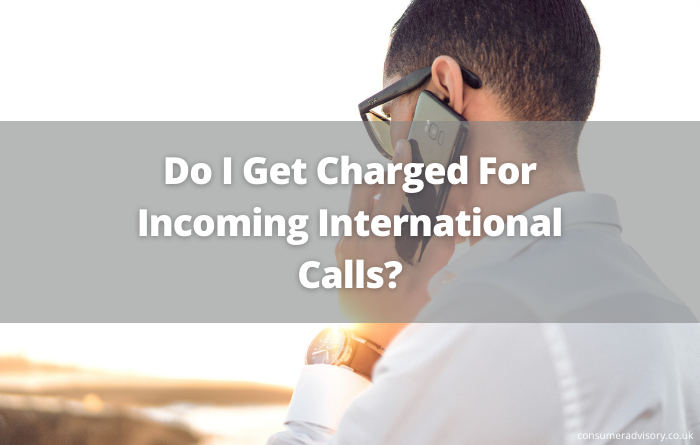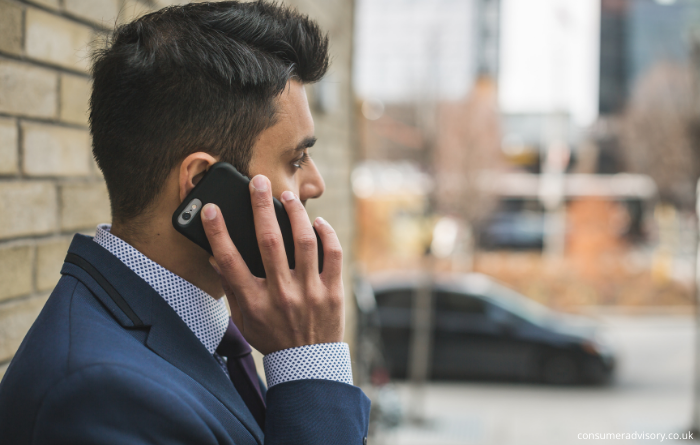

If you’re expecting a call from someone abroad, you might be wondering ‘do I get charged for incoming international calls?’. As long as you are in your home country, you shouldn’t be charged for receiving an international call. However, it’s always best to check with your network provider to avoid any unwelcome surprises.
In this article, we’ll explore international call charges in more detail, as well as answering some of the most commonly asked questions on this topic.
When a call is made internationally, it is paid for by the person making the call. This is providing the person receiving the call is within their home network country. For example, if your friend goes on holiday to Spain and your mobile phone network is registered in the UK, your friend will be charged international call rates for making a call to your mobile. You should not be charged for receiving the international call.
If you made a call from the UK to your friend in Spain, you would be charged at your standard network rate. Your friend may be charged for receiving the international call, as they are outside their home network country.
However, if you call an international number, you will be charged for the call. The amount that you will be charged will depend on the network that you are with and your contract.
It’s always best to check prices with your network provider before making or receiving an international call, just to be sure.
Yes, you can receive long distance calls for free on your mobile phone. This is providing that your are within your home network country when you receive the call. If you’re not within your home network country, check with your network provider to see if they offer roaming. Roaming is where you can use your phone abroad at an extra cost.
If you’re within your home network country, you shouldn’t be charged for receiving a call from someone abroad. However, if you’re not within your home network country, check with your provider to see if they offer roaming services.

If you make a call to someone abroad from your mobile phone, you will be charged at your standard network rate. Check with your network provider for more information on their international call rates.
When it comes to making calls internationally, or receiving them, it’s always best to check with your network provider first. This way, you can avoid any unwanted charges.
Minutes are used to make calls to other mobile phones and landlines in the UK. You will not need to use any minutes to receive an incoming call, as it is free to receive a phone call as long as you are within your home network country.
If you are within your home network country and you receive an international call, the person making the call will be charged for the call. However, if you are outside your home network country, you may be charged to receive the call. In this case, it’s best to check with your network provider regarding the costs of receiving the call.
If you make a call to someone in another country, you will be charged at your standard network rate. The amount that you’re charged will depend on your network provider and your contract. It’s always best to check with your network provider before making an international call, just to be sure.
There could be a few reasons why you’re receiving random international calls. It could be a wrong number, or it could be someone trying to scam you. If you receive an unexpected call from an international number, it’s best not to answer it. If you do answer it, don’t give away any personal information.
If you think you’re being scammed, hang up the call and report it to your network provider.
If you’re receiving unwanted calls from an international number, the best thing to do is to block the number. This way, you won’t receive any more calls from that number. To block a number on your mobile phone,
– Open your phone’s settings
– Tap on ‘call blocking’ or ‘block numbers’
– Add the number that you want to block
– Tap on ‘block’ or ‘add to blacklist.’
Once you’ve blocked the number, you shouldn’t receive any more calls from them.
Alternatively, you can contact your network provider and ask them to block incoming international calls. It’s important to note that you may miss genuine international calls if your phone is blocked from receiving this type of call.
No, your phone will not be hacked if you answer a call from an unknown number. However, if you answer the call and give away personal information, like your bank details, you could be scammed. If you receive a call from an unknown number, it’s best not to answer it. If you do answer it, don’t give away any personal information.

The main risk of answering an international call is that you could be scammed. If you answer the call and give away personal information, like your bank details, you could end up losing money. It’s best to avoid answering calls from unknown numbers, just to be safe.
If you think you’re being scammed, hang up the call and report it to your network provider.
In general, international calls are more expensive because of the distance that the call has to travel. Calls between two countries have to travel further than calls within the same country. This means that the call has to go through more phone lines, which ultimately costs more money.
The price of international calls can vary, depending on your network provider and your contract. It’s always best to check with your network provider before making an international call, just to be sure.
There are a few ways that you can make international calls without spending a lot of money.
One way is to use a VoIP (Voice over IP) service, like Skype or WhatsApp. These services use the internet to make and receive calls, so they can be cheaper than traditional phone calls.
Another way to save money on international calls is to buy a calling card. Calling cards can be purchased online or from most convenience stores. They usually offer discounts on the price of international calls.
You might also find that some mobile phone networks have international calls included in the package. If you need to regularly make and receive international calls, it may be worth looking for a cell phone contract that offers international calling as standard.
Finally, you could also consider using a prepaid SIM card. Prepaid SIM cards can be purchased from most mobile phone providers. They typically offer cheaper rates for international calls than regular SIM cards, allowing you to make and receive calls at a lower cost.
No, WhatsApp does not charge for international calls. This means that you can receive free incoming calls from international numbers, as well as making free calls. However, you will need to have an internet connection in order to use the service.
If you’re making an international call from a country with high data rates, it’s best to use a Wi-Fi connection. This way, you won’t be charged for the data that you use.
If you’re travelling internationally, there are a few ways to avoid iPhone charges. One way is to turn off data roaming on your phone. This way, you won’t be charged for any data that you use while you’re abroad.
Another way to avoid iPhone charges is to buy a local prepaid SIM card. This way, you can use a local data plan and avoid roaming charges. You’ll also be in charge of exactly how much you spend, as you’ll top up the sim card with credit before using it.
Finally, you could also consider using a Wi-Fi connection instead of data. This way, you won’t be charged for any data that you use while you’re abroad. Many hotels, restaurants and shopping centres offer free WiFi that you can use to reduce your international phone bill.
If you’re expecting a phone call from a loved one abroad, you might be asking the question ‘do I get charged for incoming international calls?’. After all, you need to know exactly what you can expect to pay before you answer the phone!
You won’t usually be charged for receiving an international call, providing you are in your home network country. However, it’s always best to check with your network provider, to avoid any huge and unexpected charges.